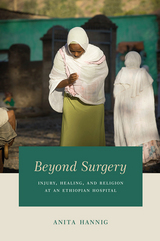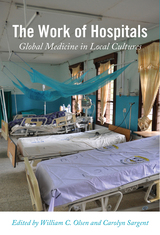2 books by Hannig, Anita

Beyond Surgery
Injury, Healing, and Religion at an Ethiopian Hospital
Anita Hannig
University of Chicago Press, 2017
Over the past few decades, maternal childbirth injuries have become a potent symbol of Western biomedical intervention in Africa, affecting over one million women across the global south. Western-funded hospitals have sprung up, offering surgical sutures that ostensibly allow women who suffer from obstetric fistula to return to their communities in full health. Journalists, NGO staff, celebrities, and some physicians have crafted a stock narrative around this injury, depicting afflicted women as victims of a backward culture who have their fortunes dramatically reversed by Western aid. With Beyond Surgery, medical anthropologist Anita Hannig unsettles this picture for the first time and reveals the complicated truth behind the idea of biomedical intervention as quick-fix salvation.
Through her in-depth ethnography of two repair and rehabilitation centers operating in Ethiopia, Hannig takes the reader deep into a world inside hospital walls, where women recount stories of loss and belonging, shame and delight. As she chronicles the lived experiences of fistula patients in clinical treatment, Hannig explores the danger of labeling “culture” the culprit, showing how this common argument ignores the larger problem of insufficient medical access in rural Africa. Beyond Surgery portrays the complex social outcomes of surgery in an effort to deepen our understanding of medical missions in Africa, expose cultural biases, and clear the path toward more effective ways of delivering care to those who need it most.
Through her in-depth ethnography of two repair and rehabilitation centers operating in Ethiopia, Hannig takes the reader deep into a world inside hospital walls, where women recount stories of loss and belonging, shame and delight. As she chronicles the lived experiences of fistula patients in clinical treatment, Hannig explores the danger of labeling “culture” the culprit, showing how this common argument ignores the larger problem of insufficient medical access in rural Africa. Beyond Surgery portrays the complex social outcomes of surgery in an effort to deepen our understanding of medical missions in Africa, expose cultural biases, and clear the path toward more effective ways of delivering care to those who need it most.
[more]

The Work of Hospitals
Global Medicine in Local Cultures
William C. Olsen
Rutgers University Press, 2022
In the context of neoliberalism and global austerity measures, health care institutions around the world confront numerous challenges in attempting to meet the needs of local populations. Examples from Africa (including, Ethiopia, Ghana, and Congo), Latin America (Peru, Mexico, Guatemala), Western Europe (France, Greece), and the United States illustrate how hospitals play a significant role in the social production of health and disease in the communities where they are. Many low-resource countries have experienced increasing privatization and dysfunction of public sector institutions such as hospitals, and growing withdrawal of funding for non-profit organizations. Underlying the chapters in The Work of Hospitals is a fundamental question: how do hospitals function lacking the medications, equipment and technologies, and personnel normally assumed to be necessary? This collection of ethnographies demonstrates how hospital administrators, clinicians, and other staff in hospitals around the world confront innumerable risks in their commitment to deliver health care, including civil unrest, widespread poverty, endemic and epidemic disease, and supply chain instability. Ultimately, The Work of Hospitals documents a vast gulf between the idealized mission of the hospital and the implementation of this mission in everyday practice. Hospitals thus become “contested space” between policy and practice.
[more]
READERS
Browse our collection.
PUBLISHERS
See BiblioVault's publisher services.
STUDENT SERVICES
Files for college accessibility offices.
UChicago Accessibility Resources
home | accessibility | search | about | contact us
BiblioVault ® 2001 - 2024
The University of Chicago Press









